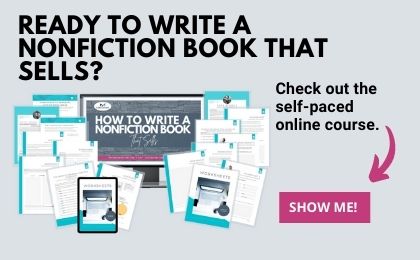Most aspiring authors never finish their book.
The vast majority of aspiring authors fail.
Not because they’re bad writers. Not because they don’t have a large following. And not because they’re not trying.
They fail because their book never sees the light of day.
Most aspiring authors never write or publish the book they’ve always dreamed about, and they get stuck in their first draft.
If you’re yearning to write your first nonfiction book, it doesn’t have to be that way for you.
In this article, I share 20 tips you can apply to write your first draft straight through.
The Downside of Writing Your First Draft Straight Through
In this method, you simply write your first draft without stopping to edit, research, or refine. The downside of this approach is that it results in a hideous first draft that requires editing and refinement. But hear me out.
The benefits far outweigh the downside because they ensure you don’t end up among the majority of aspiring authors who never become published.
The Benefits of Writing Your First Draft Straight Through
This method has some excellent benefits.
For one, it unleashes your creativity. You’re not spending time stopping to edit every little detail, which can kill your creative flow. Instead, you pour your knowledge onto physical or digital paper and worry about perfecting your manuscript later.
This method also helps you write your first draft a lot faster. This can be especially helpful if you’re struggling with writer’s block and need to get it done.
20 Tips to Help You Blaze through the First Draft of Your Nonfiction Book
Here are 20 powerful tips you can apply to write your first draft straight through.
Tip #1 – Prepare for Success
Before you sit down to write, plan for writing success. Download a copy of The Writing Success Plan through the FREE Nonfiction Book Starter Kit.
Tip #2 – Start with a Book Outline
An outline will help you organize your thoughts and structure your book. It helps you stay focused and speeds up your writing process. Additionally, an outline is helpful during the editing process, and your editor may request a copy. It’s up to you how much to outline.
Tip #3- Designate a Writing Space
Dedicate one consistent space where you write. This space can be anywhere you feel comfortable, such as a coffee shop, home, or office. Organize the area, so it’s conducive to focusing and writing.
Tip #4 – Write from Beginning to End
Start at the beginning of your outline and write straight through. Don’t worry about finding the perfect words. Just write the gist of what you have to say. If you get stuck and can’t think of anything, add a placeholder, highlight it, and move on.
Tip #5 – Eliminate Distractions
Take a moment to eliminate distractions in advance. What kinds of distractions do you anticipate in the space you selected? What distractions have you experienced in the past when you’re trying to focus? Make a list of these and mitigate them in advance. For instance, if you have a spouse who visits your office frequently, you can discuss your need for uninterrupted writing time.
Tip #6 – Establish a Writing Schedule and Stick to It
Establish a consistent schedule to write, commit to that schedule, and place it on your calendar like any other important appointment. It doesn’t have to be an hour. It doesn’t have to be five hours. Do whatever is realistic for you but make the commitment and keep it as if you were meeting with your most important client.
Tip #7 – Establish Your Total Word Count Goal
Decide on the type of book to write and how many words it will have. Some people set their goals by the number of pages. However, I like using the number of words because it’s the most common yardstick in the book writing and self-publishing journey. However, use whatever measurement will work for you.
Tip #8 – Commit to Your Writing Session Goals
Decide on what you will accomplish during each writing session. Will you write a certain number of words per session? Will you work on a certain number of pages? Will you cover a specific section of your outline? Determine what you can realistically accomplish.
Because of my high drive for results, I like using session word count goals. These are measurable and easy for me to track. However, you don’t have to use word count goals if they will create more work for you rather than help you.
There are other ways to track your progress. It can be as simple as getting a visual read of how much you write in the session. Think about what makes you happy and will spark your motivation.
Tip #9 – Don’t Overthink It
If you’re like me, you may tend towards perfectionism. If this is you, resist that urge knowing that you can go back and refine your first draft after it’s done. There’s no such thing as perfection. It’s a figment of our imagination that stifles action.
If I had waited to publish my first book until it was perfect, I would still be an aspiring author. I will always find flaws in my work.
Trust me, let it go and move on.
Tip #10 – Set a Timer
A great way to eliminate overthinking is to set a timer during your writing session and stop writing when the timer goes off. Don’t worry about beautiful prose, grammar, or anything else. Just write what you already know following your outline. Your first few writing sessions may not be as productive as you would like, but it’s okay. The more you write, the more productive you’ll become. Once you get into the flow of writing, it will be easier to keep going.
Tip #11 – Find the Timing that Ignites Your Flow
The right amount of time for your writing sessions will ignite your flow.
People are unique. What works for one doesn’t work for all. Some prolific authors recommend writing in short, 10 to 15-minute bursts. Others swear by short sessions of 30 minutes to an hour. Yet others suggest marathons lasting hours, days, or longer. None are right or wrong.
When I wrote my first book, I was pressed for time and desperately wanted to finish it. Thus, I started with 30-minute bursts, which were long enough to get some writing done but short enough to squeeze into my jammed-packed daily schedule.
At first, it was hard to get into the writing zone. However, the more I wrote, the more I entered into deeper states of flow, and the 30-minute increments started feeling short. I incrementally increased the length of my writing sessions, and today I schedule a minimum of two hours at a time.
Try different increments of time for your writing sessions to determine what works best for you. Your body, mind, and productivity levels will tell you when your timing is spot on.
Tip #12 – Focus on Writing
The best way to finish the first draft is to focus on writing. Get all your knowledge out of your head and onto the page without judgment. When you finish your first draft, you can start adding the missing pieces and refining your content.
Your first draft is not your final book. You’re not going to be judged by it. Your first draft will be the ugly start of the beautiful book you’ll publish and get into the hands of your ideal reader.
Tip #13 – Don’t Edit
While you’re writing your first draft, don’t edit. Just write your thoughts and knowledge. Your goal for the first draft is to systematically document what you know. Edit and refine it later, as doing so now will kill your creativity and flow. Also, if you try to make everything perfect as you go, you’ll never get anything done.
Tip #14 – Don’t Stop to Research
As you write, your brain will come up with ideas to include in your first draft that require additional research. You may want to insert an exciting statistic, some data, or other juicy information. Don’t stop to research now. Instead, add your idea as a placeholder within the text and highlight it, so you can conduct your research later.
Tip #15 – Take Breaks
Writing without taking breaks may be tempting when you’re eager to get your book done. However, this isn’t always prudent.
Writing can be taxing. Taking periodic breaks can help refresh your mind and body, leading to better focus and concentration when you sit back down to write.
How often to take breaks and what to do during this time depends on what works for you. Just be careful not to get side-tracked or get into procrastination mode.
Tip #16 – Know When to Take a Break
Take a break from writing if you’re feeling sick, tired, or overwhelmed. But don’t let yourself get too distracted. Once you start writing, it’s crucial to keep going until you reach your goal.
Tip #17 – Track Your Progress
Find a way to track your progress that works for you. I’m results-oriented, so I like to track my progress using Microsoft Excel. However, I’m a structured person and love quantifying my results. Still, I know this type of tracking doesn’t work for everyone.
However, there are other ways to track your progress. You can eyeball your manuscript and see how many pages you’ve written. Or you can check off the parts of your outline you’ve already drafted. Find what works best for you, but track your progress.
Tip #18 – Get an Accountability Partner
Partner with a friend, family member, or coach who will help you stay accountable for meeting your goals. Having someone to report your progress to gives you the extra push to continue on course.
Tip #19 – Celebrate Your Wins
At least once a week, examine your progress and celebrate your wins. Share your successes with like-minded people who are on the same journey. Having others celebrate with you helps you stay motivated and plow through.
You’re welcome to join our Nonfiction Book Accelerator Facebook Group and share your wins there. You can also post any questions you have about your nonfiction book writing and self-publishing journey.
Tip #20 – Write! Write! Write!
There will be days you don’t have the motivation to write. Even so, jump on your computer and write something.
Writing your first draft straight through isn’t for everyone. Regardless of your writing method, the key to success is staying organized, committing to writing your first draft, and taking the action necessary to finish.
Happy writing!
About Sylvia Melena
 SYLVIA MELENA is the Founder and CEO of Melena Consulting Group, a leadership and management consulting, training, and nonfiction book coaching company. She is also the international award-winning author of Supportive Accountability: How to Inspire People and Improve Performance and the former Vice President of the San Diego Book Awards Association.
SYLVIA MELENA is the Founder and CEO of Melena Consulting Group, a leadership and management consulting, training, and nonfiction book coaching company. She is also the international award-winning author of Supportive Accountability: How to Inspire People and Improve Performance and the former Vice President of the San Diego Book Awards Association.
As an unknown author with zero platform, Sylvia’s first book became a #1 Amazon Best Seller, sold thousands of copies across five continents in its first year alone, and was used to train leaders in university and workplace settings. It also gave her exposure in the Society of Human Resources Management HR Today, Entrepreneur, the Human Performance Association, My Quest for the Best, LEADx, Fit Small Business, and other outlets.
0









